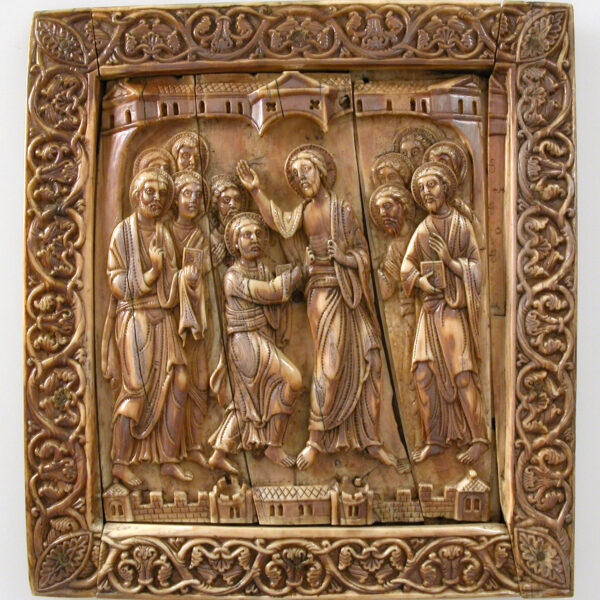
Message for the Second Sunday of Easter, Year A (4/16/2023)
John 20:19-31
We all know the reputation the disciple Thomas has earned as a result of the famous Easter story in our Gospel from John today. The conventional interpretation sets “Doubting Thomas” apart as a negative example, blessing later generations of Christ followers “who have not seen and yet who have come to believe.” But, I’m inclined to stick up for Thomas. After all, he demands nothing more than to “see the Lord,” as the others already have. And if we’re to be honest, who among us who has not seen the risen Christ has not also doubted the resurrection? In any case, the traditional focus on any individual disciple’s belief or unbelief distracts from the heart of today’s Gospel. This is a story about Jesus, not Thomas.
More specifically, this is a story about Jesus’ “generous offer of himself” to one he loves.[1] For as devastating as the cross is to the wider messianic movement, Jesus’ death is also personal. Thomas is as heartbroken as anyone that Jesus is gone so suddenly. And what’s worse, Thomas misses out on the first resurrection appearance to the disciples. How lonely that must be.
Still, Jesus does not abandon Thomas. In fact, he makes a second appearance to benefit Thomas in particular. “Peace be with you,” Jesus repeats to everyone in the house, then to Thomas he says: “Put your finger here and see my hands. Reach out your hand and put it in my side. Do not doubt but believe.” It’s possible to hear that as a reproach: Since you demand proof, here it is… although you shouldn’t have needed it in the first place. But, I hear in Jesus’ words an offer of loving reassurance instead: Thomas, I know you’re grieving and you feel alone, but I’m here. See the scars of my suffering – death hasn’t done me in. I’m alive. Take heart!
Death is personal, to be sure, but so is the risen Christ. The gospel, as Thomas learns, is not “something to be believed but someone who makes believing possible.”[2] That someone comes to Thomas at the right time with a word of peace that passes understanding, and so reawakens his hope and sustains him for the trying times that lie ahead.
April 4th marked the anniversary of Martin Luther King, Jr.’s assassination in Memphis. A giant in the history of American activism, King’s unyielding commitment to racial, economic, and geopolitical justice was rooted firmly in his faith. And for him, God was deeply personal, the defender of each individual disciple:
Admitting the weighty problems and staggering disappointments, Christianity affirms that God is able to give us the power to meet them. [God] is able to give us the inner equilibrium to stand tall amid the trials and burdens of life. [God] is able to provide inner peace amid outer storms. This inner stability of the [person] of faith is Christ’s chief legacy to his disciples. He offers neither material resources nor a magical formula that exempts us from suffering and persecution, but he brings an imperishable gift: “Peace I leave with you.” This is that peace which passeth all understanding.[3]
That conviction developed from a particular experience that King describes in a famous sermon called “Our God is able.” In the wake of the Montgomery bus boycott, he was increasingly aware of the threat to his safety, and became discouraged to the point of giving up. But, after an especially menacing late-night phone call, King had a life-changing experience, often called the “kitchen table experience,” but that we might also call Dr. King’s “Thomas moment.” Hear the story as he tells it in his own words: [Strength to Love, pp.113-14]
[1] Gail R. O’Day, in The New Interpreter’s Bible, Vol. IX, 852.
[2] Karoline Lewis, “When Seeing is Believing,” www.workingpreacher.org/craft.aspx?post=5123.
[3] “Our God is Able,” Strength to Love, 112.
Liturgy © 2023 Augsburg Fortress. All rights reserved. Used by permission under OneLicense # A-706920.
Liturgy © True Vine Music (TrueVinemusic.com). All rights reserved. Used by permission under CCLI license #11177466.

